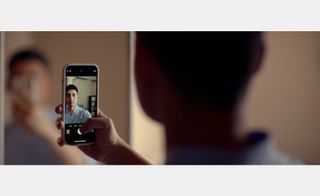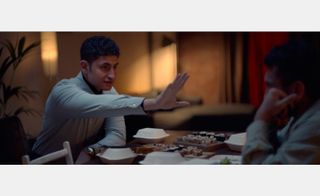By his personal admission there are least seven movies woven into Naqqash Khalid’s debut characteristic In Digital camera, a singular image that on its floor alone faucets into the unrelenting nature of appearing and the business’s phoney relationship with identification politics. ‘Filmmaking is like an iceberg, a variety of stuff you set below the floor,’ displays the writer-director. ‘Then when an viewers pulls one thing out, it is actually validating.’ Pitched in its earliest type as an idea album by way of a phrase doc dressed up as a Tumblr, Khalid in the end produced a up to date riff on the fairytale, albeit one knowledgeable by the British New Wave that loops in Virginia Woolf’s Mrs Dalloway and hopes to evoke the beat swap in Frank Ocean’s ‘Nights’.
“I really feel like my mind is a blender. Every part I’ve ever put into it evokes me, however I actually wished to make a fairytale”
Director, Naqqash Khalid
‘I really feel like my mind is a blender. Every part I’ve ever put into it evokes me, however I actually wished to make a fairytale. I’m fascinated by representing life because it feels, not essentially as it’s, and there’s a fluidity that fairytales supply,’ he explains. ‘I am taking part in with tonalities and genres so much with this movie, however there’s something actually conventional a few protagonist in a fairytale going from innocence to expertise. So I might say it is a post-colonial fairytale, this character is coming into whiteness nearly, or a sure sort of masculinity.’ Certainly, after we meet Nabhaan Rizwan’s Aden, a jobbing actor and prepared sponge for a large number of projections, he’s inherently a car for the ‘anxious younger man’ archetype, immediately’s stand in for the ‘indignant younger man’ of early Nineteen Sixties cinema suggests Khalid.
(Picture credit score: Conic Movies)
‘I like actors and the medium of efficiency; how human the artwork type is,’ he continues. ‘Efficiency is so inside, and I am actually impressed by modernist literature that performs with streams of consciousness and articulating interiority. There’s one thing so attention-grabbing about every part a face and physique says, however does not let you know essentially in phrases.’ This idea is probably most distinct in Aden’s new housemate Conrad (Amir El-Masry), a inventive director sort working in trend, whose assured bravado is essentially skilled by way of hand gestures. With Bo in the meantime (Rory Fleck Byrne), the overworked junior physician with whom Aden had beforehand, apparently, lived alone, Khalid employs a few of the movie’s extra overt surrealism: buildings violently haemorrhage on his watch, a merchandising machine seems in the midst of the street.
Furthermore, all through In Digital camera dialogue, props and situations are duplicated, changing into echoes and visible curiosities; in a therapist’s workplace two clocks are stacked one above the opposite, as elsewhere Aden redelivers traces imposed in prior setting, or mirrors Bo’s use of the stethoscope, the 2 males variously unnerved by unusual noise. ‘Repeating and doubling is in every single place,’ asserts Khalid. ‘Geometric abstraction was enormous for this movie, tessellations, repeating patterns, loops. I knew early that this story was going to loop and repeat, and so I used to be taking a look at artists like Rasheed Araeen and Anwar Jalal Shemza to actually inform the construction of the movie.’

(Picture credit score: Conic Movies)
Anchoring the broader image is a stream of examine that underscores the filmmaker’s daring intentions and educational perspective (Khalid dropped out of his PhD to make the movie). ‘I used to be studying plenty of abolitionist literature – Frantz Fanon, Malcolm X, bell hooks, Angela Davis – who all discuss this concept of reimagining society,’ he says. ‘That was actually inspiring, like how do you inherit techniques which might be essentially damaged? Naomi Klein’s On Hearth: The (Burning) Case for a Inexperienced New Deal was actually massive for this too, how she talks concerning the position of the artist and this radical pondering that recognises the system we’re at the moment dwelling in is killing us, be it local weather, patriarchy or white supremacy.’
Describing himself as a inventive outsider, Khalid recognised early on the potential – and necessity – for difficult typical filmmaking practices. ‘Let’s be actual, cinema was developed by the navy. The strategies and gear we use has been used in opposition to individuals who appear to be me – photographers, initially, have been despatched to the International South to take footage to nearly justify subjugation,’ he notes. ‘Even immediately, on a technological and psychological stage, it’s a medium that harms individuals. So I am having to invent and reimagine what I wish to do inside this medium, interrogating it to make it work for me.’
“Even immediately, on a technological and psychological stage, [cinema is] a medium that harms individuals. So I am having to invent and reimagine what I wish to do inside this medium, interrogating it to make it work for me.”
Director, Naqqash Khalid

(Picture credit score: Conic Movies)
‘All of that sounds fairly didactic and mental: how do you set it into a movie that is humorous and entertaining?’ he continues. One response was to play with etymology, specifically because it pertains to ‘taking pictures’. In an already fraught scene on a photographer’s set then, Khalid and sound designer Paul Davies changed the noise of the digicam shutter with gunshots. ‘I do know a standard viewers member isn’t going to select up on that, however to me, each layer transfers, it registers indirectly,’ says the director. ‘I am form of obsessive about discomfort, so there’s plenty of nervousness and violence all around the sound design, that isn’t essentially current visually. It goes again to my core intention: as quickly as you are invested in interiority and the way one thing feels to anyone, that’s liberating and releasing as a result of there aren’t any limits.’
In Digital camera is in cinemas now
conic.movie
Supply: Wallpaper

